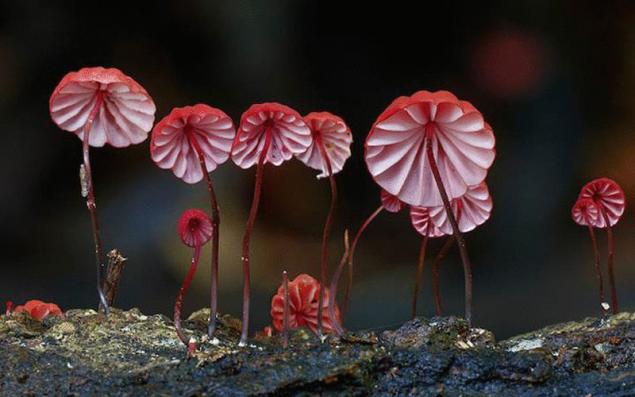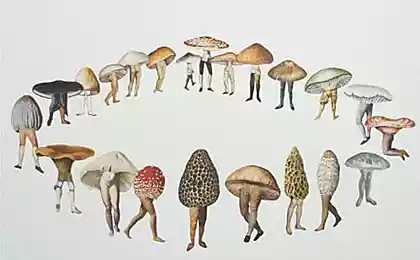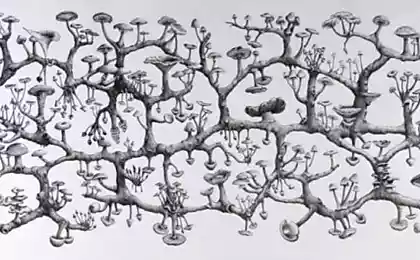393
Mushrooms — the collective mind?
In the 90-ies of the last century the idea of a collective mind mushrooms start to increasingly arouse the interest of researchers. And 10 years later, in 2000, experiments were conducted, the results of which shook the scientific community.
Japanese biologist and a physicist, Toshiyuki Nakagaki organized a series of interesting experiments. Taking the maze, which checks the memory and intelligence of lab rats, he is one of the entrance put a yellow moldy mushroom and a piece of sugar.

Physarumpolycephalum (scientific name mushroom), just driven by the scent of "sweet", immediately released thread in search of food. All branches of the maze filament bifurcated. As soon as one of them had hit a dead end, she was developed and then accurately followed the "route" more successful sprout. By the end of the day, the mushroom got to the sugar.
In the next stage of the experiment the scientist took the process Physarumpolycephalum (the same who participated in the first experiment) and placed it at the entrance to an identical maze. Near the exit, put the sugar. At this time, the fungus produced only two threads: one instantly found the right way to tidbits... and the second is up to the "ceiling" of the maze and reached the sugar directly!
In his third experiment, Toshiyuki Nakagaki put the mushroom on a three-dimensional map of Japan – to the place where he was designated Tokyo. Next, the researcher put the pieces of products at the points corresponding to major cities of the country. What happened next was beyond any explaination: when the mushroom allowed the filament to the food, his gossamer with almost absolute accuracy has repeated the railway map of Japan! That is, this unknown body for several hours has done the same work, which for decades engaged in professional engineers in the field of paving roads! published
P. S. And remember, only by changing their consumption — together we change the world! © econe
Source: olmins.info/civilizaciya-pod-nazvaniem-griby/.html
Japanese biologist and a physicist, Toshiyuki Nakagaki organized a series of interesting experiments. Taking the maze, which checks the memory and intelligence of lab rats, he is one of the entrance put a yellow moldy mushroom and a piece of sugar.

Physarumpolycephalum (scientific name mushroom), just driven by the scent of "sweet", immediately released thread in search of food. All branches of the maze filament bifurcated. As soon as one of them had hit a dead end, she was developed and then accurately followed the "route" more successful sprout. By the end of the day, the mushroom got to the sugar.
In the next stage of the experiment the scientist took the process Physarumpolycephalum (the same who participated in the first experiment) and placed it at the entrance to an identical maze. Near the exit, put the sugar. At this time, the fungus produced only two threads: one instantly found the right way to tidbits... and the second is up to the "ceiling" of the maze and reached the sugar directly!
In his third experiment, Toshiyuki Nakagaki put the mushroom on a three-dimensional map of Japan – to the place where he was designated Tokyo. Next, the researcher put the pieces of products at the points corresponding to major cities of the country. What happened next was beyond any explaination: when the mushroom allowed the filament to the food, his gossamer with almost absolute accuracy has repeated the railway map of Japan! That is, this unknown body for several hours has done the same work, which for decades engaged in professional engineers in the field of paving roads! published
P. S. And remember, only by changing their consumption — together we change the world! © econe
Source: olmins.info/civilizaciya-pod-nazvaniem-griby/.html
The first hybrid flywheel power storage will be built in Europe
3 ways outside the box to spend time at the cottage























